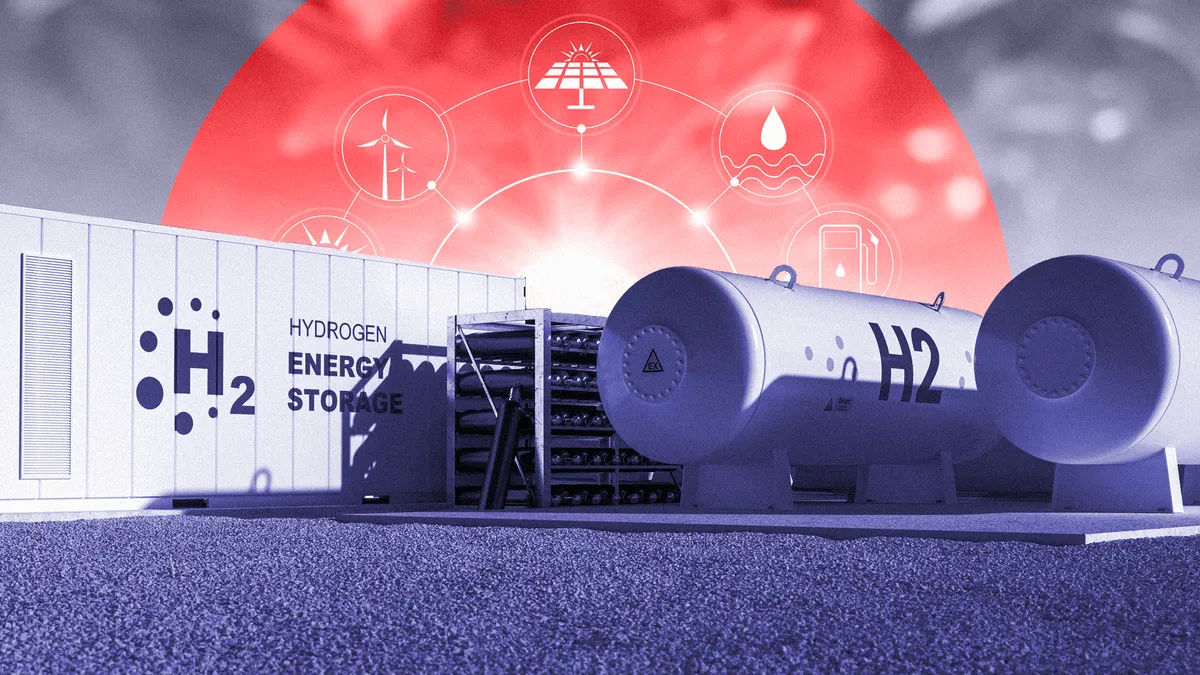Dive Brief:
-
Converting renewable energy to hydrogen as a means of long-term storage in the energy sector could hold the key to helping hydrogen achieve scale and move into the industrial mainstream, multiple experts agree.
-
Electrolysis costs have decreased 40% in five years, putting green hydrogen on track to achieve cost parity with hydrogen converted from fossil fuels, or 'blue hydrogen', according to Ajay Mehta, general manager for new energies research & technology at Shell, who spoke at a Tuesday panel hosted by GreenBiz.
-
Enel Green Power and other companies have begun plans for co-locating green hydrogen plants with renewable energy developments in the U.S., which according to IHS Markit is on tract to exceed $1 billion in hydrogen production within three years.
Dive Insight:
Shoring up the economic viability of hydrogen will require "massive amounts of collaboration," according to Mehta, but after several false starts, he and others see reason to believe hydrogen is about to establish a foothold.
"Hydrogen has gone through multiple hype cycles, and has not met its ambition," Mehta said. But thanks to advances that have boosted the availability of renewable energy and increased government support, he said, "maybe the stars are finally getting aligned."
Hydrogen is already gaining traction in the transportation sector, with Shell currently building hydrogen fueling stations in California and Germany, Mehta said. But he said increased adoption of green hydrogen production in the energy sector held the key to increasing scale and decreasing costs to competitive levels for other industrial applications.
According to analysis by IHS Markit released the week preceding the panel, hydrogen production is on track to exceed $1 billion by 2023, based on the number of projects already in advanced planning phases. Assuming plans for large-capacity electrolysis plants remain on track, green hydrogen could achieve cost parity with blue hydrogen by 2030 in regions with good access to renewable resources, and by 2040-2050 in additional locations, according to Soufien Taamallah, director of energy technologies and hydrogen research at IHS Markit.
"If plans for large capacity electrolysis plants (100 MW+) do not materialize," Taamallah said in an email, "it will be difficult to reach cost parity with blue hydrogen."
But electrolysis is only one part of producing green hydrogen, said Sunita Satyapal, Director of the U.S. Department of Energy's Hydrogen and Fuel Cell Technologies Office. The price of electricity represents the majority of the cost of hydrogen, she said, but hydrogen could achieve cost parity if the cost of electricity dropped to 3 cents per kWh or lower — which she said low-cost renewable generation is on track to achieve.
However, during the GreenBiz panel, Satyapal questioned whether cost parity with other fuels was the sole means for hydrogen to achieve scale. Rather, she said it could fill an important gap in the energy industry — the need for long-duration, seasonal storage of renewable energy.
"It's been pretty well shown that batteries can only go so far," she said. Converting energy to hydrogen could enable the storage of "gigawatts" of renewable energy, she said.
Once stored, it's not necessarily a given that the hydrogen would be converted back to energy, Satyapal said. Hydrogen could be sold to facilitate the decarbonization of steel manufacturing, fertilizers and oil refining — opening a potential revenue stream for utilities that could, in turn, further decrease the price of decarbonization in the electric sector.
These sorts of deals are already in the works, Mehta said. Indeed, the day after Tuesday's panel, Enel Green Power announced plans to integrate green hydrogen production into a solar project in the U.S., with the intent of selling the hydrogen produced to a bio-refinery through an agreement with NextChem and Marie Tecnimont.
"In the next five to ten years, I think there is a lot of potential," Satyapal said.














